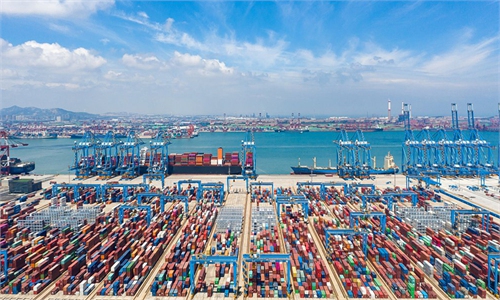
Illustration: Chen Xia/GT
The Third Plenary Session of the 20th Communist Party of China (CPC) Central Committee is convening in Beijing from Monday to Thursday to make strategic arrangements for further comprehensively deepening reform and promoting Chinese modernization. This is a global event. As the world's second-largest economy faces various new problems and situations at home and abroad, how China faces and solves them will not only directly affect the current international situation but also have a strong demonstration effect. Whether to choose isolation and decoupling or opening-up and cooperation, a zero-sum game or win-win, will have different impacts on human society. Therefore, as the Third Plenary Session is convened, the whole world is focusing on China.
An important external background of this meeting is that economic globalization, which has been ongoing for decades, is facing unprecedented threats, with increasing distrust and division plaguing international political and economic relations. The development of technology brings opportunities but also creates problems. For instance, the development of internet technology creates more convenience for people but also generates new security risks; advanced technology improves production efficiency but also exacerbates wealth inequality in some places; the prevalence of social platforms accelerates the circulation of information but also leads to an increase in fake news. At the same time, global financial crises, regional conflicts, and other sudden events have been occurring frequently, pushing human society to a historical crossroads.
Against the backdrop of some major countries irresponsibly shifting blame and responsibility to foreign countries, using external disputes to transfer domestic conflicts, and seriously affecting the stability of the global industrial chain and supply chain, China unhesitatingly raises the banner of reform and opening-up. By promoting Chinese modernization through further comprehensively deepening reform and sharing the achievements of modernization with the world, China has achieved a historic leap from peaceful coexistence to shared destiny. The determination and courage shown by the ruling party of China, as well as the firmness and unity of the Chinese society in "carrying out reform to the end," provide valuable positive energy for a world filled with changes and turbulence.
China has not blamed others for the various new problems it faces, instead, it constantly strives to improve, innovate, and enhance itself. This is a sign of a great nation's broad-mindedness and sense of responsibility. China's reform has adhered to the core value of putting people first and always combined goal orientation with problem orientation, with the Chinese leader emphasizing "going after the problem and focusing on solving it." Therefore, China's reform has shown a virtuous cycle: It is driven by problems, and deepens through continuous problem-solving. The ultimate result is that China has created the rare economic miracle of rapid development and the social miracle of long-term stability. Western politicians who doubt that China achieved high-speed development by "stealing Western achievements" have actually not understood the underlying logic of China's development.
It is particularly worth mentioning that the Third Plenary Session of the 20th CPC Central Committee will not only outline a new blueprint for China's economic and social development, but also bring new opportunities to foreign enterprises hoping to tap into the Chinese market. The meeting focused on a number of core issues such as comprehensively deepening reform, promoting Chinese modernization, optimizing the business environment, and strengthening international cooperation. As General Secretary of the CPC Central Committee Xi Jinping said on multiple occasions, "China's door of opening-up will only open wider, and will never be closed." China's reform and development are precious assets, both for itself and for a fairer international order. From the perspective of promoting economic globalization, China's firm support for trade liberalization and facilitation of investment, as well as its strong opposition to various forms of unilateralism and protectionism, are all contributing to maintaining global trade stability and removing obstacles hindering world economic development.
In March, Chinese President Xi Jinping, when meeting with representatives of the US business, strategic, and academic communities, stated: "China's reform will not pause, and its opening-up will not stop. China is planning and implementing a series of major steps for comprehensively deepening reform, and steadily fostering a market-oriented, law-based and world-class business environment. This will create broader development space for US and other foreign businesses." Adhering to the use of opening-up to promote reform, development, and innovation, China will continue to advance its opening-up to a higher level. People have reason to expect fruitful results from the Third Plenary Session of the 20th CPC Central Committee, which will accelerate the upgrading of China's connectivity with the world to a higher level and bring more opportunities and cooperation to the world.


